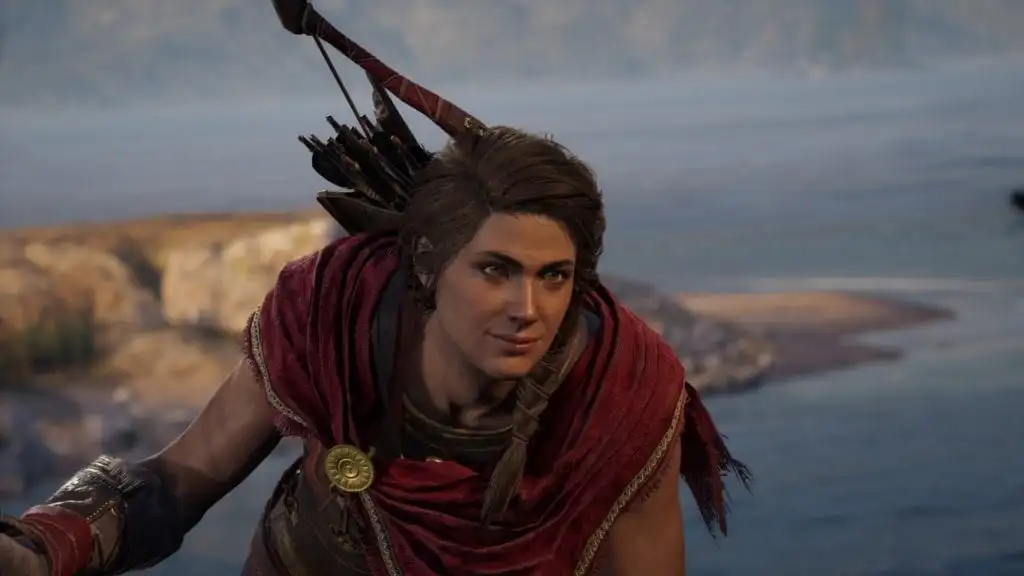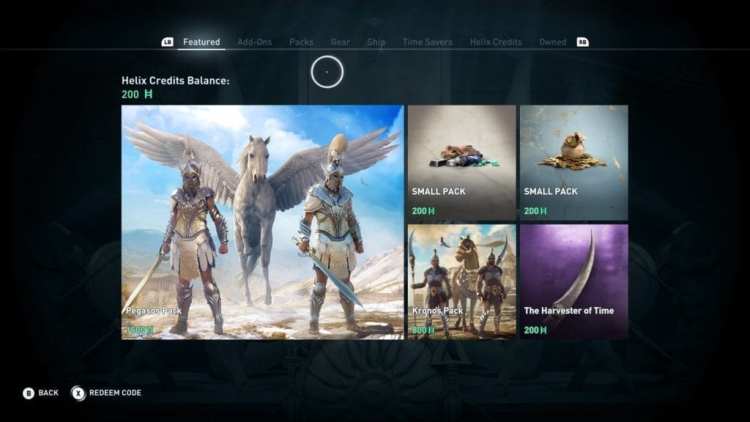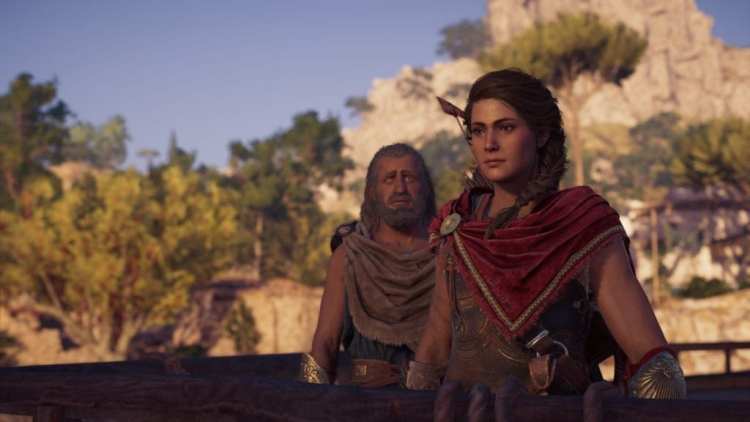Long-running video game franchises have had their fair share of detractors. Ever so often, there’d be a particular game in the series that sours the opinions of many fans. Then again, there comes a time when one title ends up redeeming the entire thing altogether. For Ubisoft’s flagship action-adventure franchise, that’s Assassin’s Creed Odyssey. The company embraced the action-RPG dynamics for Odyssey, even more so than Origins, breathing new life into the series. This review for the PC version of the game aims to show the many features and improvements of the game as well as a few minor disappointments.
Assassin’s Creed Odyssey: The New And The Old
For starters, I considered myself a fan of the series’ earlier games. Over a decade ago, the first Assassin’s Creed game filled me with wonderment. The sequel made me clamor for more. And then we had Assassin’s Creed 3 which left a bad taste in my mouth. Black Flag, for all the praise it has received, couldn’t wash it out. Unity was a hard pass. And, although I had Syndicate, I barely lasted a few hours until I had to put it down. Gone was the mystique and allure of what initially hooked me to the Assassin’s Creed franchise. It was replaced by trivial tropes and asinine collectibles. That’s the reason why, even though long-time fans praised Origins’ direction, I still did not budge.
Then came Assassin’s Creed Odyssey. It provides that fresh and unique twist, taking the lessons from Origin to heart and learning from them. As mentioned above, Ubisoft fully embraced the action-RPG genre this time around. This feels less like a formulaic Assassin’s Creed game and more like a new hybrid IP.
Yes, some old tropes still remain — the destinies of characters intertwined? Yep, still there. A ruthless organization, the Cult of Kosmos (proto-Templars) hell-bent on dominating the known world? They’re still around. A delightful romp through a pivotal historical moment? Yes, we have that too. Tons of collectibles in various locations? Definitely.
What sets Odyssey apart is how it manages to keep everything tightly interwoven in a refreshing package.
By The Gods!
Assassin’s Creed Odyssey is set in Classical Greece — 431 BCE to be more precise. Interlocking alliances and political power-plays brought us the Peloponnesian War, a conflict between the Delian League led by Athens and the Peloponnesian League backed by Sparta.
Every town and location looks and feels vibrant. For instance, your island home of Kephallonia is fairly humble and quaint, a far cry from the megalopoleis of Athens and Corinth. Students of history will also feel a sense of awe the moment they visit ancient wonders that are either lost or left as ruins in the present day. The Lightning Zeus statue, for one, gets a funny quip from your character. Making your way to the Temple of Apollo at Delphi might give you shivers. Seeing The Acropolis and The Parthenon in their unblemished splendor? Magnificent! Ah, and visiting the Lion of Leonidas on the hallowed grounds of Thermopylae whilst the Greek historian Herodotus provides exposition — now that’s impressive.
Given that this is Greece, after all, the gods come into play literally and figuratively. NPCs will often mention the wrath of the gods, their strength, or their effects on daily life. Likewise, long-time players would know of Jupiter, Juno, and the other “gods.” They are the Isu, the First Civilization or Precursor race worshipped as Hellenic gods by ancient man. Ubisoft’s decision to finally take us to this time period opens more doors for Assassin’s Creed’s narrative arc.
Characters, Choices, And Consequences
As a married man who also hands the controller to my wife so she can explore the game, we naturally chose the heroine Kassandra over the male protagonist, Alexios. This was the first of many choices we had to make over the course of the game. The choices presented in the dialogue wheel can have minor effects like an extra item or new information. Conversely, these choices can also have major consequences both short term and long term. One of the earliest dilemmas you face concern a village suffering from a plague. Your decision will have adverse effects which you can’t foresee until much later in the game.
As for the cast, without spoiling too much, know that many of them feel lively and dynamic. Each character feels unique in his or her own way with a splicing of that Greek fire (for lack of a better term). A certain passion or gusto for expressing oneself. And yes, you will encounter the luminaries of history from Leonidas, to the aforementioned Herodotus, to Pericles and many more. You might even meet denizens of myth and legend.
You’ll also have romances and relationships in the game. These feature a few side quests for you to tackle before you can woo and sleep with a particular NPC. Romances are not restricted to gender at all. My Kassandra happily teased Odessa (the first romance option you’d meet) in every dialogue choice.
This Is Sparta!
Combat in Assassin’s Creed Odyssey is fast-paced and fluid. It also requires a lot of practice to master the art. You can’t just happily “Sparta Kick” your way to victory all the time, although fancying yourself as Gerard Butler in 300 sure does work.
You have an assortment of weapons to choose from each with their own unique animation and combos. They have their own rarity and, naturally, the rarer the better. They can also be upgraded to your level or engraved with unique effects. Ranged combat is via your trusty bow and arrow. Assassinating targets, a staple of a franchise remains a treat.
Your character has three unique skill trees to pump ability points in — the Hunter, Warrior, and Assassin trees — signifying ranged combat, melee combat, and assassinations respectively. It’s as simple as holding down a button and pressing the appropriate key to use that ability. Combat mastery is a necessity for survival. You’ll need to dodge or parry enemies, sometimes dozens of them, while using the terrain and obstacles to your advantage.
Since there’s the Peloponnesian War going on, you can partake in how it plays out. Certain regions in the world map may have sided with either Athens or Sparta. You can turn the tide by harrying troops, burning supplies, and eliminating the leader. Doing so forces a Conquest Battle where you can either attack or defend. Attacking provides more loot but takes more effort of course; defending has one less loot item but tends to be easier.
In The Navy
In relation to general combat, naval warfare is back in Odyssey and it’s as exhilarating as ever. Your ship, the Adrestia, can sail the open seas and go head-to-head with pirate vessels and those from other city-states. Maneuvering the Adrestia is fairly easy and the controls are responsive. Don’t worry about running aground due to a cumbersome vessel.
When facing opponents on land, should you knock them out you can recruit them as a lieutenant on your ship. This includes mercenaries and bounty hunters that you’re up against. Just like items, lieutenants have their own rarity and so you’ll want to be on the lookout for legendary tier combatants. Your chosen lieutenants will also join boarding actions against enemy ships so you can see them in battle.
There’s nothing more adrenaline-pumping than shooting a volley of fire arrows at an enemy ship and boarding them when they’re weak, followed up by Spartan-kicking everyone to their watery graves. It’s that or you just cleave the ship in half and pick up the salvage afterward.
Exploring The Unknown
As with every Assassin’s Creed game, Odyssey has a slew of locations to explore and collectibles to obtain. You’re aided by your trusty mount, Phobos, whom you can direct to follow the road on the way to an objective. Likewise, your eagle Ikaros can point out certain key individuals and secret entrances from high above. Odyssey also has the tried-and-tested Guided Mode where you’ll see where you need to go next, plainly visible on the map. Or you can choose the new Exploration Mode where you’ll only get clues to your next location and you’ll have to discover it yourself.
There is a multitude of side quests you can engage in via bounties and contracts. These can come from NPCs, Message Boards (a Hermes statue in town or on your ship), or from quest items. Underwater ruins and tombs can also be discovered and ransacked.
Each region on the world map has multiple sectors, each with their own set of collectibles or completion requirements. Various locations also have an Ainigmata Ostraka. These collectibles provide a clue on where you need to go to obtain engravings for your gear. Also, there are Ancient Tablets to find which allow you to upgrade your ship.
Finally, certain bounties and spots grant Orichalcum Ore. This rare commodity can be exchanged in the Oikos of the Olympians in Phokis. Sargon the Merchant’s wares include notable epic and legendary gear, as well as a loot urn — the Olympian Gift. This one contains a random epic or legendary gear, including items from the premium store.
Cosmetics/Microtransactions in Assassin’s Creed Odyssey
Yes, Assassin’s Creed Odyssey does have microtransactions in the premium store. These can be obtained via Helix Credits (bought with real cash) or Ubisoft Club points. A majority are fairly tame such as cosmetic changes to your horse or ship. Others award legendary gear which looks really stylish. Don’t fret since it’s a single-player game, you’re only fighting the computer AI anyway. There’s no pay-to-win competition among other players.
Other offerings include materials (time-savers) for those who dislike farming them. There are also EXP and Drachmae (in-game currency) bonus perks that transfer across multiple saves. For the latter, some players might be worried if leveling is stunted due to the existence of time-savers. This isn’t the case as lots of quests still provide tons of experience points during your playthrough.
Nothing seems invasive or mandatory thus far and we hope Ubisoft keeps it that way.
Assassin’s Creed Odyssey: Voyaging ever onward
The game runs at a smooth 60-75 FPS on my rig but, since this game review is getting too lengthy, we’ll cover that in our Benchmark and Technical Review instead. There are little to no performance issues to speak of, at least not from what I’ve experienced.
Mechanics-wise, there are a few caveats. Conquest Mode doesn’t feel fully fleshed out and you’re just doing it for the loot. For instance, I heroically conquered Megaris by helping Sparta. An hour later while chasing down a cultist, Spartan soldiers in an encampment were suddenly hostile. That’s no way to treat a heroine! Then again, it can be explained in the background that these proto-Templars have wiggled their way further into the armies. It’s either that or your questionable loyalties as a misthios or mercenary/hired servant. Still, some minor tweaks to the feature would be welcome.
Likewise, the romance options feel a bit too shallow. Doing side quests is fine. It’s just that the payoff isn’t too enthralling. They’re just short-term dalliances — nothing more, nothing less. Quite disappointing compared to romance side quests in Dragon Age, Mass Effect, Skyrim, Fallout, and the like. The other minor quibble I have is the voice acting. Kassandra has such a unique temperament and vibrancy. Unfortunately, hearing Alexios feels just a bit off-putting. Like a co-worker or classmate whose voice is too big for his body.
Everything else in Assassin’s Creed Odyssey, however, remains engaging and breathtaking. It truly encapsulates an actual odyssey, a journey not just for the fans of the series but for the studio as well. The game’s narrative interwoven with the history, myth, and culture of Classical Era Greece is an outstanding piece of work. Embracing the action-RPG genre provides a unique twist for the franchise, a formula for success that can be tweaked and refined to deliver perfection in the future.
Review code was provided by the publisher.















Published: Oct 3, 2018 01:17 pm